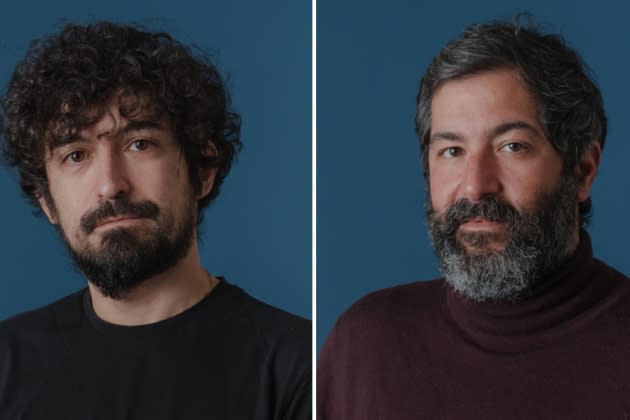‘Sacred Spirit’ Producer La Fabrica Nocturna Boards Buzzy ‘Last Night I Conquered the City of Thebes’ (EXCLUSIVE)

Paris-based La Fabrica Nocturna Cinéma, producer of Chema García Ibarra’s 2021 Locarno winner “Sacred Spirit,” has boarded Gabriel Azorin’s “Last Night I Conquered the City of Thebes,” marking another financing milestone for his buzzy, poetic and time blending Spanish project.
A Locarno Match Me! hit. “Thebes” has been put through both San Sebastián’s Ikusmira Berriak and Madrid’s ECAM Incubator, rapidly consolidating as Spain’s foremost development labs which each attract about 270 applications a year.
More from Variety
Invicta, Cinepolis Co-Produce Romantic Dramedy 'Serendipia' (EXCLUSIVE)
'Heli's' Armando Espitia Set for 'Six Months,' from Chicago Fest Winner Bruno Santamaría (EXCLUSIVE)
A Chronicle of Modern Capitalism, Competition Contender 'Suro' Bows at San Sebastian
La Fabrica Nocturna, whose credits also take in “The Heiresses,” joins Madrid’s Dvein Films, A Coruña’s Filmika Galaika (“They Carry Death”) and Lisbon’s Primeira Idade (“The Metamorphosis of Birds”) as a producer partner on “Thebes,” which won a RTP Award, consisting of the pre-buy of rights from the Portuguese public broadcaster, at late 2020’s Seville European Film Festival.
“We’ve known Gabriel for a very long time and we have always appreciated the originality and integrity of his work,” said La Fabrica Nocturna’s Marina Perales.
She added: “‘Last Night I Conquered the City of Thebes’ matches perfectly with La Fabrica Nocturna Cinéma’s author-driven, international editorial line, and we are delighted to join the film as the French producers. We are looking forward to working with Dvein Films, Filmika Galaika and Primeira Idade, and we are very confident about the success of this promising film.”
Written by Azorín and Spanish playwright and theater director Celso Giménez, “Last Night…” begins with Antonio and best friend Jota, 16 or 17, who, one cold Winter afternoon, visit some Roman baths. At nightfall, when people have gone and there is no trace left of a contemporary world, Antonio confesses to Jota that he’s afraid they are no longer friends.
It’s then that other boys appear bathing in the baths: Roman soldiers who built them 2,000 years before. And their age and concerns are not very different from those of Antonio and Jota.
Variety caught up with Azorin and Dvein Films partner Carlos Pardo Ros, producer of “Thebes,” in the run-up to San Sebastian:
There’s a photo on the entry to “Last Night I Conquered the City of Thebes” on the Incubator website which shows boys bathing night. It looks almost inspired by paintings…
Azorín: It’s a photo by Tamara de la Fuente, taken in January when we conducted a week of camera tests, working with the film’s characters, including the use of Latin. The film’s hypothesis is that you have two times inhabiting the same filmic space. Cinema allows for that.
This year’s tests are part of a far longer process….
Azorín: Yes, there’s a lot of work behind this. I first discovered the thermal baths in 2017. María, Carlos and I returned two years later with cameras especially equipped for shooting at night and the tests we made convinced us we could make the film. If you take away the swimsuits and towels, leave boys naked, it’s impossible to know what they’re from.
So you have two pairs of friends from very distant times, modern-day Portugal, the Roman Empire –sharing the same filmic space, with certain parallels between them and the audience will follow both stories at one and the same time?
Pardo Ros: They’re not just two times, but establish a relationship between each other, showing two ways in which the relationship can evolve….
And what state is the financing in?
Pardo Ros: We’re in a very good position. Before the summer, we won selective aid from Spain’s ICAA film institute, and we also have regional support from Galicia. With platform and distribution delas we’ve almost covered Spain’s part of the budget. We have Primeira Idade in Portugal and are waiting for the results of a Portuguese international coproduction fund. But we’ve covered 60% of the budget which, a year off from shooting, is good going.
And how are you positioning the film?
Pardo Ros: Knowing the kind of film it is, we know it’s got to work well at international festivals before distribution. We’ve also worked very hard during the two years of development to position the film at forums, markets, because Dvein Films wasn’t that well known. This is our first feature co-production. We’ve never worked so much on communication on any other project.
And what has the ECAM Incubator given you as a producer and director, Gabriel?
Azorín: In production terms we’ve learnt a lot,. I’m not sure there are many places in Spain where you can learn as much about independent production. As a director, I think I’ve improved a lot my way of communicating the film to others, at the level of characters, story and stylistic aspects. I’m now much better than when I entered.
Best of Variety
The Best Pop Culture Halloween Costumes for 2022: From 'Top Gun' to 'Euphoria'
'The Sopranos' Gets the Funko Pop Treatment in New Collectibles Release
From 'The Sandman' to 'Blonde': Books Made Into Movies and TV Series That You Should Read
Sign up for Variety’s Newsletter. For the latest news, follow us on Facebook, Twitter, and Instagram.

